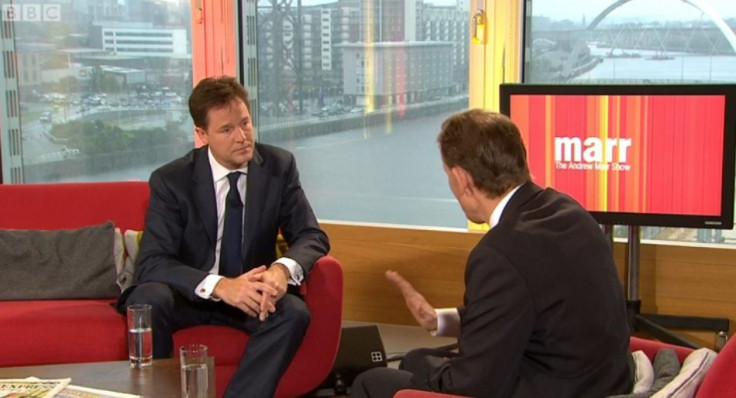Clegg Tells Lib Dem Activists: Do Not Show Your Political Colours on 2015 Campaign Trail

Deputy Prime Minister Nick Clegg has called on Liberal Democrats not to declare allegiances with the political left or right, after polls showed only one in six rank-and-file members would back a coalition with the Tories after the next general election.
He intervened as the Lib Dems came under pressure at the party's conference in Glasgow to reveal whether they would continue to side with the Conservatives in the increasing likelihood of another hung parliament.
"It is my genuine belief that if we go back to the bad old days, not of coalition or balanced politics, but of either the left or the right dominating government on their own, you will get a recovery which is neither fair nor sustainable," Clegg told the BBC.
However, his call threatened to sow confusion among voters unsure of the political colours of Lib Dem candidates, particularly when it came to deciding first and second choice candidates in the ballot preferences, and with a high number of marginal seats.
A poll by the Liberal Democrat Voice website found 39% of activists would prefer a Lib Dem-Labour alliance after 2015, compared with just 15% who favour siding with the Tories, should the Lib Dems continue to hold the balance of power.
A further 15% of those questioned said that, in the event of a hung parliament, the party should forge a "confidence and supply" agreement with Labour, under which the party would undertake not to bring down the government or vote against its budget. Only 6% would back a similar arrangement with the Tories.
A second poll, conducted by ComRes for BBC2's Sunday Politics, found 38% of Lib Dem councillors would support a union with Labour, while 16% favoured another deal with the Conservatives. Almost a quarter (23%) said the party should reject entering a coalition with either party.
Business Secretary Vince Cable remained favourite as party leader should Clegg quit, with 38% of councillors backing him. Party president Tim Farron was the preferred choice among 27%, with Treasury Chief Secretary Danny Alexander on 10%.
'Wrong kind of recovery'
Clegg denied he was "leaning towards" the Tories, saying: "Far from it, I don't want to see the wrong kind of recovery.
"I don't want to see the kind of recovery where under the Conservatives they would risk our exit from the European single market, jeopardising millions of jobs.
"They would resuscitate some of these ideas that we've blocked in government like giving employers the right to fire anyone at will.
"I think there would be a real danger, particularly with a small Conservative majority, that they would pursue ideological cuts rather than the pragmatic approach to deficit reduction we have taken in this coalition."
Clegg now faces a possible clash with activists on Monday, when he will argue against a centre-left proposal to abandon the Government's austerity plans.
His evocation of a "third way" reminiscent of Tony Blair came as a string of senior party members hinted at their allegiance with one or other of the two main parties.
Former party leader Paddy Ashdown declared he had a "preference" for entering coalition with the Tories after the next election.
Ashdown, who opposed the pact with the Tories in 2010, admitted he had been "wrong" on that question.
"Instinctively, I hate both of them. When you ask me to choose between Labour or Tories, it's like asking me whether I'd rather be run over by a train or a bus," Ashdown told the Observer.
"Wherever our hearts lie - everybody knows where that is, it's on the centre-left - the reality is that we do business in the national interest with those who the electorate have asked us to do business with."
'The hyphenated party'
Other senior Lib Dems have also entered the debate, with employment minister Jo Swinson hinting she leaned towards Labour.
"I'm perhaps not the most tribal of politicians," she told the Independent on Sunday.
"Working in a mature and adult way where you recognise what your shared goal is - that is not something which I think would be particularly more difficult with Labour than it is with the Conservatives."
The confusion led historian Simon Schama to dub the Lib-Dems the "hyphenated party".
The Deputy Prime Minister had adamantly denied he held discussions with the Tories on how to proceed in the event of another hung Parliament, insisting the decision depended on the outcome of the election.
"I think Labour would wreck the recovery, and under the Conservatives - who don't have the same commitment to fairness which we do - you would get the wrong kind of recovery.
"Our message is that coalition is good, for the Liberal Democrats to stay in government is good, let us finish the job but let us finish it fairly."
He said Labour needed to "spell out what they believe in". But he added that he was "absolutely not" already discussing a second coalition deal with the Tories.
"You have to let the British people have their say first," he said.
Speaking at the Lib Dem conference in Glasgow on Saturday night, Clegg rounded on the Tories, branding them the party of "fire-at-will", and claiming credit for stopping the government passing laws making it easier for firms to sack staff.
Lord Oakeshott, a longtime critic of Clegg, had urged the party to abandon its alliance with the Tories "six months to a year" before going to the polls.
Ashdown, who will lead the party's election campaign in 2015, called the idea "crazy". However, he said he put the coalition's success rate at "70-75% of what I expected".
© Copyright IBTimes 2024. All rights reserved.





